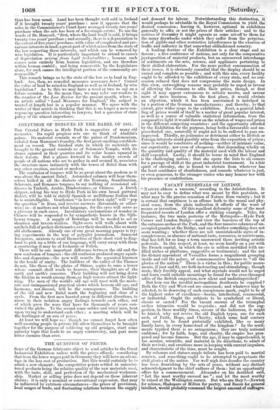CONFUSION OF TONGUES IN THE BABEL OF 185l.
THE Crystal Palace in Hyde Park is suggestive of many old memories. Its rapid progress sets one to think of Aladdin's palace. Its material reminds us of the palace of Pandemonium, exhaled from Mammon's foundry, the first great smelting-establishment on record. The finished state in which its materials are brought to the ground reminds us of Solomon's Temple, with its stones squared in their quarries and its cedar beams squared in their forests. But a glance forward to the motley crowds of people of all nations who are to gather in and around it, associates the structure more intimately with the tower of Babel than with any other erection, ancient or modern.
The confusion of tongues will be as great about the modern as it was about the ancient Babel. Astonished cabmen will hear themselves hailed in all the dialects of the Teutonic, Scandinavian, Sclavonic, and Romance tongues, to say nothing of occasional addresses in Turkish, Arabic, Hindostannee, or Chinese. A Dutch skipper, asking his way to Hyde Park in his own broad guttural dialect, will be told in stately Spanish or mellifluous Italian that he is unintelligible. Gentlemen "in love at first sight" will "pop the question" in Russ, and receive answers (favourable or otherwise) in—it matters not what language, for the eyes will serve as a glossary in such cases. Involuntary exclamations of wonder in Chinese will be responded to by sympathetic bursts in the Ojibbeway tongue. A supply of Bowrings will be needed to act as shopmen and tavern-waiters. Sight-seers will walk about with satchels full of pocket-dictionaries over their shoulders, like so many old elothesmen. Already one of our great morning papers is trying experiments in the way of polyglot journalism. Innocent foreigners, anxious to avail themselves of their short visit to England to pick up a little of our language, will carry away with them a smattering it may be of Icelandic or Polish. There will be one important difference between the old and the new confusion of tongues : the old confusion produced angry squabbles and dispersion—the new will reunite the separated kinsmen in the bonds of amity. The builders of the valley of the Thames do not, like those of the plains of Shiner, aspire to raise a tower whose summit shall reach to heaven; their thoughts are of the earth and earth's concerns. Their building will not bring down the Elohim in wrath among them, as high towers attract the lightning. The men of the world's old age will meet with the moderate and unimpassioned practical views which beseein old age, and harmony, not discord, will be the consequence. The building of the old and new Babel mark the beginning and close of a cycle. From the first men hurried away in different directions, to nurse in their isolation angry feelings towards each other, out of which grew the wars that have for thousands of years convulsed the globe. To the second come sadder and wiser men, bent upon frying to understand each other ; a meeting which will be the harbinger of an wra of peace.
At least we will hope so ; though we cannot forget how often well-meaning people in private life allow themselves to be brought together for the purpose of soldering up old grudges, start some unlucky topic that leads to an angry controversy, and part more bitter enemies than ever.
























 Previous page
Previous page